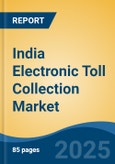Speak directly to the analyst to clarify any post sales queries you may have.
10% Free customizationThis report comes with 10% free customization, enabling you to add data that meets your specific business needs.
Growth is being driven by the expansion of cashless payment infrastructure, rising vehicle numbers, and government initiatives supporting intelligent transportation networks. Rapid development of roads, economic corridors, and increasing urbanization are enhancing the need for scalable tolling systems. Integration with banking systems and advancements such as GPS-based tolling and automatic number plate recognition are further redefining the ecosystem. As India moves toward digital mobility with supportive policies and infrastructure investments, electronic toll collection is evolving into a vital component for enhancing road usage, traffic flow, and economic output.
Key Market Drivers
Government Mandates and Policy Push for Digital Tolling
A major factor propelling the India Electronic Toll Collection market is the strong regulatory momentum supporting digital tolling across highways. The enforcement of mandatory FASTag usage since February 2021 significantly increased adoption rates, creating a uniform digital toll infrastructure that reduces congestion and prevents revenue losses. The initiative, spearheaded by the National Highways Authority of India, has expanded into urban expressways and private projects, fostering a more cohesive tolling framework nationwide. This policy shift aligns with larger governmental visions under ‘Digital India’ and ‘Smart Cities Mission’ to improve mobility and operational efficiency. State and municipal bodies are piloting automatic tolling systems on ring roads and city bypasses, with the broader aim of interoperability. As of March 2025, electronic transactions account for over 97% of toll collections on national highways, underscoring the success and scalability of government-led digital tolling strategies.Key Market Challenges
Infrastructure Disparities and Operational Inconsistencies Across Regions
The India Electronic Toll Collection market faces substantial challenges due to regional disparities in tolling infrastructure. While urban and Tier I regions are equipped with modern toll plazas and efficient systems, rural and Tier III areas struggle with outdated equipment, poor connectivity, and inconsistent maintenance. This uneven development creates confusion for drivers and hampers the objective of a seamless national tolling experience.Moreover, operational inconsistencies such as incorrect toll deductions, transaction failures, and varied enforcement policies contribute to user dissatisfaction. In many instances, hybrid tolling systems are still in use, creating a fragmented user experience. The absence of a standardized framework across toll operators further limits trust in the system. These infrastructural and operational gaps pose barriers to the full realization of a digitally unified tolling network in India.
Key Market Trends
Transition Toward Barrier-Free Open Road Tolling
A key trend shaping the market is the adoption of open road tolling systems, which eliminate physical toll booths and utilize technologies like GPS tracking, number plate recognition, and real-time analytics to calculate toll charges dynamically. This approach allows vehicles to maintain uninterrupted movement, improving traffic flow and fuel efficiency. Currently in pilot stages on select expressways, this model aligns with India’s long-term goals for smart infrastructure and clean transportation. It also enhances toll transparency, reduces emission from idling vehicles, and enables real-time monitoring for better enforcement. As technological infrastructure advances, open road tolling is expected to become the dominant model, revolutionizing digital toll operations in the country.Key Market Players
- Neology, Inc.
- Conduent Incorporated
- Cubic Corporation
- Tata Consultancy Services Limited
- Wipro Limited
- HCL Technologies Limited
- Siemens AG
- Thales Group
Report Scope:
In this report, the India Electronic Toll Collection Market has been segmented into the following categories, in addition to the industry trends which have also been detailed below:India Electronic Toll Collection Market, By Type:
- Automatic Vehicle Identification System
- Violation Enforcement System
- Automatic Vehicle Identification System
- Others
India Electronic Toll Collection Market, By Technology:
- Radio Frequency Identification
- Dedicated Short Range Communication
- Global Navigation Satellite System
- Video Analytics
- Cell Phone Tolling
- Others
India Electronic Toll Collection Market, By End User:
- Highway
- Urban Area
India Electronic Toll Collection Market, By Region:
- South India
- North India
- West India
- East India
Competitive Landscape
Company Profiles: Detailed analysis of the major companies present in the India Electronic Toll Collection Market.Available Customizations:
With the given market data, the publisher offers customizations according to a company's specific needs. The following customization options are available for the report.Company Information
- Detailed analysis and profiling of additional market players (up to five).
This product will be delivered within 1-3 business days.
Table of Contents
Companies Mentioned
- Neology, Inc.
- Conduent Incorporated
- Cubic Corporation
- Tata Consultancy Services Limited
- Wipro Limited
- HCL Technologies Limited
- Siemens AG
- Thales Group
Table Information
| Report Attribute | Details |
|---|---|
| No. of Pages | 85 |
| Published | June 2025 |
| Forecast Period | 2025 - 2031 |
| Estimated Market Value ( USD | $ 397.46 Million |
| Forecasted Market Value ( USD | $ 726.89 Million |
| Compound Annual Growth Rate | 10.5% |
| Regions Covered | India |
| No. of Companies Mentioned | 8 |









